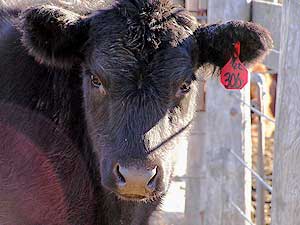|
Audio
Photos
Resources
Your Voice
|
Changing market prices worry ranchers
November 15, 2004
 |
| Changing market conditions mean ranchers will get less for their cattle. (MPR Photo/Bob Reha) |
Moorhead, Minn. — At his cattle ranch in eastern Otter Tail County, Jerry Swartz raises calves that he sells to feedlots and other ranchers. Swartz says this year, he made $100 a head this year for his calves. That's not a bad profit. But, the rancher he sold them to will be lucky to break even.
Swartz sells his animals to someone else, who fattens them for slaughter. Meatpacking companies also own herds of cattle, and Jerry Swartz says those companies have herds large enough to flood the market at critical times.
 | |||
"The price is driven by trading. We have a handful of large packer groups that can import meat from foreign countries, and they can export our meat," says Swartz. "If they can import enough, they can control the price."
The Western Organization of Resource Councils is an advocacy group for family farmers and ranchers. A recent study of theirs says 80 percent of all the cattle slaughtered in the U.S. comes from herds that are owned by packing companies.
Rancher Jerry Swartz says since packing companies control large numbers of cattle, it's easy for them to manipulate market prices. He says if the buyer for his calves get less money, it has a trickle-down effect.
"When that feedlot isn't making money, he's got to come out and he's got offer me a low price on my calves," says Swartz. "He's got to come and buy my calves really, really cheap so he can make a profit on the other end."
Swartz says if prices are down, there's less money to spend on equipment or supplies, and ultimately, Main Street businesses feel the pinch.
 | |||
It's sales day at the West Fargo Stockyards and cattle are prodded into the sales ring. A few men gaze at the animals. These days, there aren't many buyers as the auctioneer calls for bids.
Larry Christiansen is here to buy. He's spent most of his life around the business. Christiansen says prices for slaughter cattle, the animals that end up in the meat section of your grocery store, top out at 82 cents per pound. But the people he buys for need prices between 90 and 95 cents per pound.
Christiansen says some ranchers are nervous after a profitable year. They're hesitant to spend or borrow money to fully restock their herds.
"And now he's sitting back not wanting to get way in debt again," Christiansen says of those ranchers. "It's just kind of the way it's working out with some of those guys. They're more cautious about buying, and maybe not feeding quite as many as they had been."
Economists say what's happening is the normal cycle of things in the beef industry. Tim Petry, an economist at North Dakota State University, says it's not surprising that prices for some ranchers are low.
 | |||
"Last year at this time, we were just extremely short of choice grading cattle -- that's the high grading cattle. This year, that isn't the case," says Petry. "We do have an ample supply of choice grade fed cattle, so they (ranchers) are simply selling less than they were a year ago."
Petry says there are too many cattle available and that's driving the price down. He says ranchers have benefited from good weather, so they have ample feed for herds. While prices were high, herd numbers grew, resulting in the glut.
Rancher Jerry Swartz doesn't buy Petry's explanation. He says the real problem is much more complex. Swartz says farmers and ranchers have no ability to affect markets. He says farmers and ranchers must work together to change that situation.
|
News Headlines
|
Related Subjects
|
